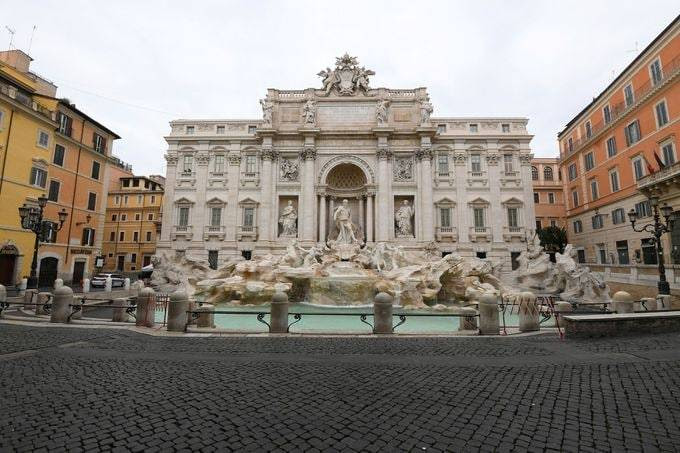A neighbor showing up with a homemade cake in hand is normally a welcome surprise. But the situation in which Rome bureau chief Chico Harlan finds himself right now is anything but normal.
When a thoughtful neighbor came by this week to gift the reporter a southern Italian cake, Harlan couldn’t help but notice that he was standing quite close. As the man talked animatedly in his kitchen, Harlan, a touch paranoid, wondered if the neighbor’s voice sounded raspy.
“This is the thing it does to you. It turns you into an a--hole,” Harlan said of the coronavirus pandemic. “When you start to become afraid of your own neighbors who are wonderful people, then there’s really no hope.”
With routines totally upended, daily life is bizarre. Apart from the handful of Italians waiting two meters apart for groceries, everyone stays inside. Harlan occasionally takes a solo jog in the mornings, an activity that may be restricted by the government at any moment. He lives across the street from a popular wine bar that, on a normal day, is brimming with stylish Italians who keep the neighborhood up into the early hours of the morning. It was the bane of Harlan and his wife’s existence. Now?
“I’d kill for that noise, the clatter of people having a good time,” he said.

(Alberto Lingria/Reuters)
|
The couple has a 7-month-old son, whom they take up to their apartment’s communal rooftop for fresh air. They can’t stay long; there’s no patio furniture, just dirty concrete. While the little guy isn’t exactly begging to go outside and may be too young for friends, the pandemic and the resulting lockdowns have the potential to shape the personalities of this generation’s children, who may eventually go months without normal social interactions, Harlan said.
“Eerie doesn’t quite get it because it feels more like post-apocalyptic,” he said. “On top of that, the weather is perfect every day. These are normally the days where you would feel almost celebratory just waking up in this city, in this country.”
“It’s not like you can just go out and report on the ground in Italy,” Harlan said. “The ground is gone.”
Harlan has been mystified by photos of bare supermarkets across the globe, from Australia to back home on 14th Street NW in Washington, D.C. Rather surprisingly, Italians aren’t panic buying. Perhaps we can chalk that up to a more realistic — if not pessimistic — approach to this period of isolation.
“You can’t really panic buy if you’re ready for six months of disruption or a year of disruption,” Harlan said. “There’s no amount of tomato sauce that will get you that far.”
As Americans stock up on toilet paper, experts and health-care providers are scrambling to predict what chaos lies around the bend and prepare. Officials have said that the United States is just 10 days behind Italy. Will our neighborhoods look like Harlan’s in two weeks?
The early trickle of new coronavirus infections has turned into a steady current. By creating simple simulations, we can see how to slow it down.
|
|
We translated the simulator into 12 languages, and more are coming:
An illness like covid-19 was always Fauci’s nightmare. Will the nation and its leaders now follow the doctor’s orders?
|
|
In the days since, in one phone call after the next, Franco Arminio has received an intimate portrait of Italy under coronavirus lockdown.
|
|
|
No comments:
Post a Comment